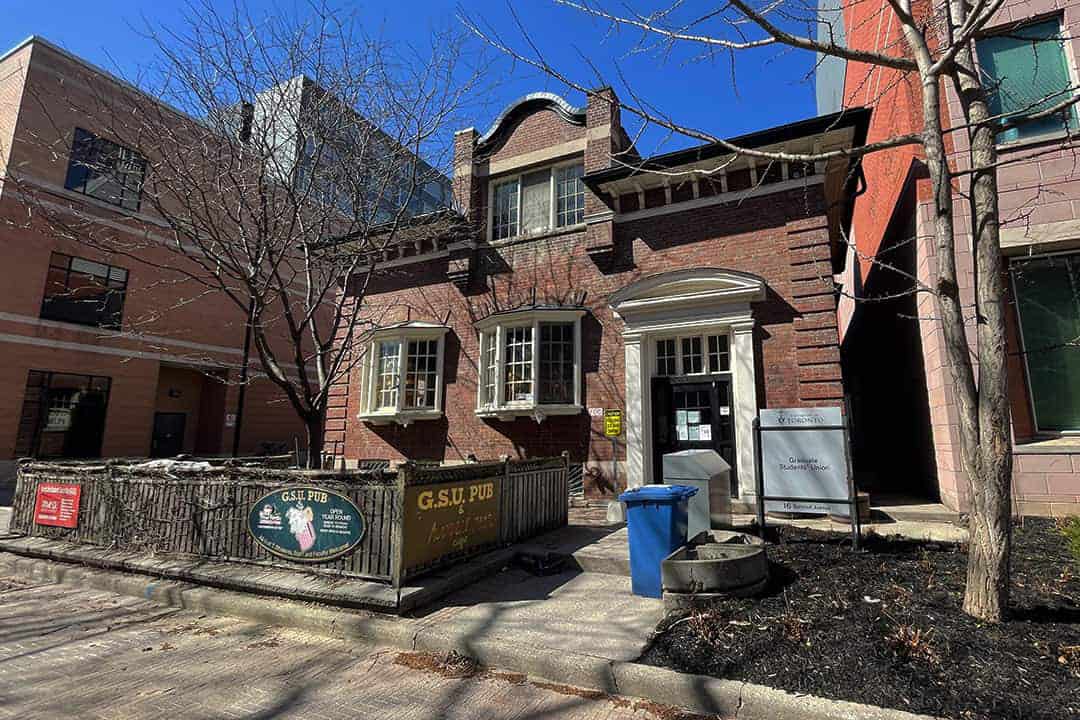On December 7, the University of Toronto Graduate Students’ Union (UTGSU) met virtually for its Annual General Meeting (AGM), where attendees approved a major restructuring of the UTGSU’s board of directors.
The attendees also approved the audited financial statements for 2020–2021 and a number of motions submitted by members prior to the meeting, which included a new bursary for First Nations, Métis, and Inuit graduate students, as well as other emergency grants. A motion for the UTGSU to look for ways to increase mental health coverage under the health care plan was also approved at the meeting. Executives also delivered mid-year reports on their activities from the last semester.
UTGSU board restructuring approval
Over the course of this academic year, the UTGSU executive committee has been discussing approving a major overhaul of its board and bylaws in order to comply with the Canada Not-for-profit Corporations Act. This includes changing the General Council model to a standard Board of Directors that’s much smaller in size, reshaping the Executive Committee to have a clear president and vice-president structure, and giving monthly honorariums of $500 to board members and $1400 to executives. Hired legal counsel Matthew Joseph gave a brief overview motivating the changes and mentioned that, currently, the “UTGSU, unfortunately, doesn’t follow any typical standard principles of the common law and how it affects directors, meaning that you don’t have an electoral system that clearly and directly elects your directors.”
There was some conversation by members who expressed concerns over the semantics of the large bylaw changes, but most spoke in favour of the changes. Amy Conwell, director of the Canadian Union of Public Employees Local 3902, spoke in favour of the changes, applauding the plan’s “thoroughness.” “I haven’t seen this level of work go into supporting an organization and becoming better in a long time,” she said.
Ultimately, the entire restructuring passed.
Financial audit
Finance Commissioner June Li gave a discussion of the UTGSU’s financial audit for the fiscal year ending on August 31, 2021. Li said that the union passed the audit with “flying colours.”
One attendee raised a question on the inclusion of $25,000 for a settlement in the financial audit. June mentioned that the settlement was with a former executive director and that while she was unaware of the specific rationale behind the settlement, its documentation was cleared by the independent financial auditor. After some more minor discussion, the members approved the financial audit.
Member-submitted motions
A number of member-submitted motions were discussed at the meeting. The first motion called for the UTGSU to investigate options to increase mental health coverage under the UTGSU health and dental plan, and for it to present its findings to the Board of Directors by March at the latest. The motivator for the motion noted that, currently, the UTGSU health and dental plan only offers $500, which likely only covers two or three sessions from external providers. They mentioned that the University of Toronto Students’ Union, for example, covers 15 visits at $100 for each session, for a total of $1,500. The motion passed.
The second motion called for the UTGSU to create a new bursary for First Nations, Métis, and Inuit graduate students with a total value of $15,000 to $20,000, to be split among a minimum of four students. Riley Yesno put forward the motion and motivated it. The motion passed.
Two further motions, both of which passed at the AGM, led to the UTGSU donating $25,000 to the UofT Emergency Food Bank and creating an emergency grant allocation for $250,000.
A motion put forward by the UTGSU’s former internal commissioner, Lynne Alexandrova, called for the official accommodations provided through U of T’s Accessibility Services to be implemented into the UTGSU, so members can get accessibility accommodations for union activities. Many members at the meeting appreciated the sentiment of the motion but felt like it existed outside the purview of the UTGSU; thus, it failed to pass.
Executive reports
UTGSU executives delivered reports on their work over the previous semester. Academics and Fundings Commissioner, Divisions 1 and 2 Dhanela Sivaparan highlighted various initiatives in her portfolio, such as the extension of the graduate student COVID-19 fee waiver, with consultation from the School for Graduate Studies. Additionally, she discussed working on a lobbying document with external student organizations to address federal and provincial student debt.
Academics and Funding Commissioner, Divisions 3 and 4 Danielle Karakas discussed working directly with students in her division, as well as working on food security and “working toward getting a robust system that will offer food to financially insecure students.”
Civics and Environment Commissioner An-Noûra Compaoré discussed various elements of her portfolio, emphasizing provincial election engagement for the upcoming 2022 election. She mentioned the various committees she sits on, such as the Community Liaison committee, which discusses fees, and projects and the impacts they will have on students.
External Commissioner Justin Patrick discussed the work that the union has done to connect to external partners and bodies. He mentioned that the UTGSU is now a part of the United Nations Sustainable Development Goals learning group, as well as the Canadian Coalition for Youth, Peace & Security.
Internal Commissioner Sarah Alam mentioned the work she’s done on the bylaw amendment and restructuring model for the union. Additionally, she mentioned her advocacy on student family housing.
University Governance Commissioner Lwanga Musisi discussed attending and organizing meetings with university administration, as well as working with university decision-making bodies like the Governing Council, the academic board, university affairs, and others.
Finance Commissioner June Li discussed her work involving the financial activities of the UTGSU, as well as her work on the basic funding initiative.


